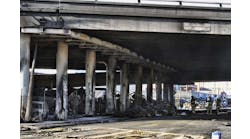Future levels of transportation funding in Michigan will determine the conditions, safety and congestion levels of the state’s roads and bridges, as well as the economic health of the state and the financial burden to Michigan households in the form of crashes, delays, bridge backlogs and vehicle operating costs. A report released March 28 examines four possible transportation funding scenarios over the next decade, ranging from current levels and rates of investment (which are inadequate even to maintain the transportation system in its current condition) to an investment level capable of providing significant improvements in conditions and safety and significant reductions in congestion.
The report, “Where Are We Going? Current and Future Pavement and Bridge Conditions, Safety, and Congestion Levels of Michigan’s Roadways and the Impact on Michigan Households, Based on Investment Levels over the Next Decade,” was issued by TRIP, a Washington, D.C.-based national transportation research organization.
While it will require a significant increase in transportation investment per Michigan household over the next decade to realize substantial improvements in the transportation system, these additional expenditures are more than outweighed by reduced costs associated with traffic crashes, congestion-related delays, bridge backlogs and additional vehicle operating costs as a result of driving on rough roads.
Inadequate roads, highways and bridges currently represent a financial burden to the average Michigan household of $3,014 annually in the form of traffic crashes, delays caused by traffic congestion, extra vehicle operating costs due to driving on rough roads and in the cost to repair the state’s structurally deficient bridges.
If the state continues to invest in its transportation system at the current funding levels, the TRIP report calculates that by 2022, the cost per household will rise to $3,649. However, if Michigan invests in roads and bridges at a level that would achieve a significant improvement in road and bridge conditions and performance, by 2022 the average annual household cost of inadequate roads, highways and bridges will decline to $1,745.
Currently, 35% of Michigan’s major roads are rated in poor condition. Thirteen percent of the state’s bridges are currently structurally deficient and in need of repair, rehabilitation or replacement.
To read the full press release, go to www.tripnet.org/docs/MI_TRIP_PR_03-28-12.pdf


